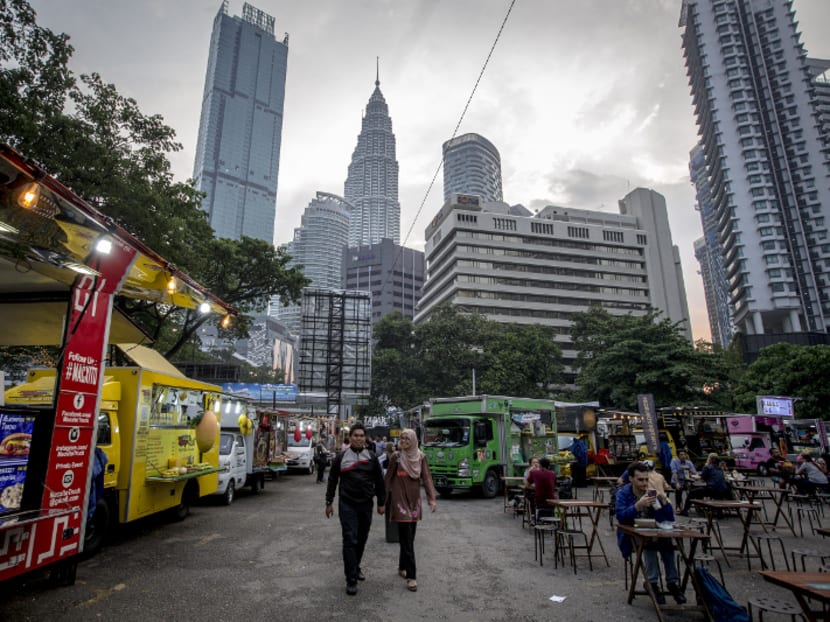Roadside stalls in KL to be replaced with food trucks by 2020, says Malaysian minister
KUALA LUMPUR— Two years from today, Kuala Lumpur’s central business district (CBD) will be completely absent from roadside stalls.

Food trucks seen at ‘Tapak: Urban Street Dining’ along Jalan Ampang. The place was previously a parking lot, but is now operated by a private company to house food trucks for a fee. Photo: Malay Mail Online
KUALA LUMPUR— Two years from today, Kuala Lumpur’s central business district (CBD) will be completely absent from roadside stalls.
The roadside stalls will be replaced by food trucks and push carts operating in designated areas, said Malaysia's Federal Territories Minister Tengku Adnan Tengku Mansor.
As the city changes, Mr Tengku Adnan said it is also time for small food businesses to “evolve” if they want to continue operating in the CBD.
“They can’t operate a business in the city under an umbrella all their lives,” he added.
“We have no intention of making life difficult for the traders, instead we will help them to upgrade to food trucks and push carts,” he told Malay Mail.
Mr Tengku Adnan said there is a misconception that there are plans to do away with stalls and three-wheeled motorcycle hawkers in Kuala Lumpur.
“That’s not the situation. We need to make adjustments so that we match other cities in the world. This upgrade will improve cleanliness and do away with the ugly sight of stalls scattered everywhere,” he added.
The Putrajaya Member of Parliament said the CBD will be the first to roll out this project but it will eventually be extended to other areas.
Part of the plan is to create dedicated food truck parks where these food trucks and push carts can operate during designated hours such as during the lunch and dinner periods.
“DBKL will provide basic amenities such as water and power supply as well as waste disposal facilities,” he said, referring to City Hall by its Malay abbreviation DBKL.
Mr Tengku Adnan added that the ministry and City Hall are already working with traders to explain they have to move according to the times if they want to continue operating in the CBD.
“I don’t want this to be looked at as a Malay dominated business, or people to have the perception the help is exclusively for the Malays. It’s not true, this is open to all races,” he said.
Many traders say funding is the main obstacle they face when it comes to “upgrading” themselves.
Mr Tengku Adnan said the ministry is engaging with truck manufacturers as well as raw food wholesalers on ways to keep the cost low.
“We are also starting training to assist them with the operations,” he said.
He said a basic truck can cost between RM80,000 (S$27,160) and RM140,000 and even with the RM10,000 grant from the ministry, it is still a big loan that these traders need to take on.
Other options are to use recon vehicles or smaller trucks.
“We are also considering the use of pull carts or trollies which can be attached behind their cars so they can park and operate the business,” he said.
He added that Majlis Amanah Rakyat (MARA) and National Entrepreneur Group Economic Fund (Tekun) will also assist with funding.
“There is no rule for all to use the same kind of truck or vehicle. They have other options to consider because if one is selling drinks, they don’t need the biggest truck,” he said.
“I saw in Rio de Janeiro where old Volkswagen vans are used to operate food business. Such options are also viable,” he added.
Mr Tengku Adnan also said that cost cannot be used as an excuse all the time.
He said it is important that the traders be innovative. “We will work with them from scratch and find ways where they are not burdened by the vehicle installments,” he added.
The project does not include bazaars and pasar malam (night market).
“All we want is a liveable clean city. We need the co-operation of all the business operators to make this happen,” he said.
The ministry has two years to educate the traders. Previously, Mr Tengku Adnan said the ministry targets 1,000 food truck business licenses to be issued by year-end to realise the aim of zero roadside traders in KL by 2020.
He said to date City Hall has already issued 220 of such licences. MALAY MAIL ONLINE






